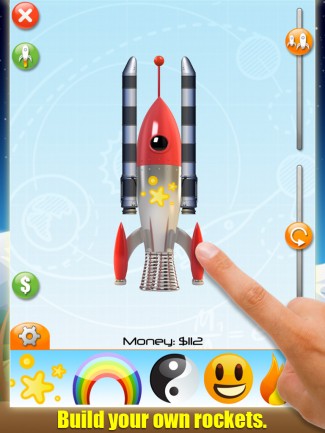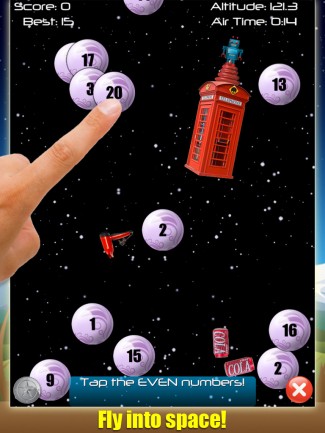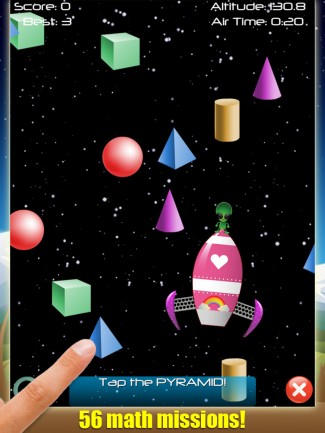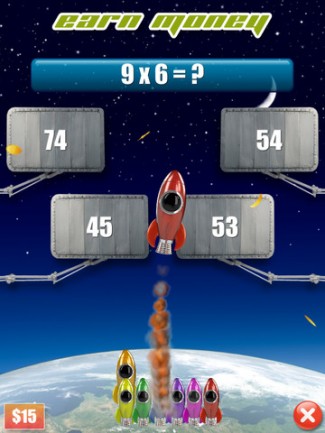Bastion
LQ: 9.15
Recommended Age: 10+
Skills Used: Planning, Working Memory, Mathematics, Reading

Mathmateer is an iOS action game in which players build a rocket to maintain enough “hangtime” to solve a series of math problems. Players choose from problems involving money, numbers, time-telling, geometric shapes, and multiplication. The goal is to solve them as quickly as possible. The faster the equations are completed, the more points players will score. Bronze, silver, and gold medals are awarded for high scores. Mini-games are also available as a way to accumulate game money. Game money can be used to purchase rocket upgrades, which allows rockets to remain airborne for longer periods of time. Mathmateer is a great game for children who need extra help with math, as they must learn to think critically and react in a fast-paced environment. The is no inappropriate content, but basic math skill are required, making the game appropriate for ages 6 and up.
Getting started and then maintaining attention and effort to tasks.
 Mathmateer requires sustained focus and mental effort if players want to be awarded a gold medal. Answering questions is a touch-based activity, forcing players locate and carefully tap each answer. Since there are a clutter of possible answers on the screen at any given time, players must seek out the correct responses among a myriad of incorrect ones. The takes a keen eye and the ability to multi-task, solving mental computations as they scan the screens numerics for the correct responses.
Mathmateer requires sustained focus and mental effort if players want to be awarded a gold medal. Answering questions is a touch-based activity, forcing players locate and carefully tap each answer. Since there are a clutter of possible answers on the screen at any given time, players must seek out the correct responses among a myriad of incorrect ones. The takes a keen eye and the ability to multi-task, solving mental computations as they scan the screens numerics for the correct responses.
Developing a systematic approach for setting and achieving goals.
A certain degree of foresight is necessary for players who wish to remain airborne for an extended period of time. In order to fly to a higher altitude, upgrades to rockets must be made. Players earn upgrades by playing mini-games. During mini-games, players answer questions until they give a wrong answer. Mini-games are essential for garnering higher scores in the game mode. Players must also think carefully about building their rocket. Though it is important for rockets to have enough power to fly to high altitudes, building too many thrusters will cause the rocket to move too quickly, preventing players from accessing all the potential answers. Players should plan to build a rocket that moves quickly, but not so fast that answers whizz by, causing their scores will suffer.
Use this PlayTogether guide to learn how you can help your child turn Mathmateer play time into a positive learning and relationship-building experience. To learn more about why playing games with your children is so important, check out our Science of Play page.
Take a minute to talk with your child about how Focus and Planning work, and why these Thinking Skills are important for success in school and at home.
 Mathmateer is a single-player game, so take turns playing with your. After reading over "How it Helps," see if you can team up with your child, each taking turns between levels to try and achieve the objectives listed below.
Mathmateer is a single-player game, so take turns playing with your. After reading over "How it Helps," see if you can team up with your child, each taking turns between levels to try and achieve the objectives listed below.
Gameplay Goals:
After you have played built a second rocket in Mathmateer, take a minute to pause the game and talk with your child about how the game is exercising your Focus and Planning skills.
Our Make it Work activities are designed to transform your child’s gameplay to real-world improvements in thinking and academic skills. If you’re just getting started with LearningWorks for Kids, we suggest you try them all to find which are the best for you and your child.
Read over the Focus and Planning pages, then take some time to introduce these thinking skills to your child.
Explain that:
 Use competition to sustain focus. For instance, challenge your child to a race. For example, tell her to see whether she can fully complete a portion of her homework before you finish putting away the groceries after shopping. If your child has a competitive nature, encourage her to come up with strategies for competing against herself or others. Engage siblings, friends or other caregivers in these friendly contests.
Use competition to sustain focus. For instance, challenge your child to a race. For example, tell her to see whether she can fully complete a portion of her homework before you finish putting away the groceries after shopping. If your child has a competitive nature, encourage her to come up with strategies for competing against herself or others. Engage siblings, friends or other caregivers in these friendly contests.
List the steps. Many children have difficulty in conceptualizing the multiple steps it takes to complete a book report, prepare and clean up after a meal, create a Facebook page, or get ready for a family vacation. Writing a list is a good way to think through multiple steps and to break down larger goals into smaller tasks. Try it first with an activity that your child has completed successfully in the past. As she constructs the list, ask for a rationale behind her choices in regards to the order of the steps.
 As the name would imply, Mathmateer incorporates key math concepts into an interactive, gaming environment. Players can practice addition, subtraction, multiplication, division, geometry, and telling time. Gameplay is timed, so players cannot deliberate for too long. They must react quickly - almost instinctively to earn a medal. For extra work, players should try the mini-games, where there is an infinite amount of time to practice the logic and quick thinking necessary to get a gold medal. Even building a rocket tasks players to combine spacial intelligence with a basic understanding of physics, in order to propel the spacecraft into the atmosphere.
As the name would imply, Mathmateer incorporates key math concepts into an interactive, gaming environment. Players can practice addition, subtraction, multiplication, division, geometry, and telling time. Gameplay is timed, so players cannot deliberate for too long. They must react quickly - almost instinctively to earn a medal. For extra work, players should try the mini-games, where there is an infinite amount of time to practice the logic and quick thinking necessary to get a gold medal. Even building a rocket tasks players to combine spacial intelligence with a basic understanding of physics, in order to propel the spacecraft into the atmosphere.
 Children with ADHD struggle sustaining the necessary mental focus to complete a task. Their impulsivity is often accelerated by competeing outside stimuli. Children with ADHD never completely master a subject due to their inability to complete an assignment in one sitting. Mathmateer is an engaging math app, that will absorb children into practicing math techniques without realizing it.
Children with ADHD struggle sustaining the necessary mental focus to complete a task. Their impulsivity is often accelerated by competeing outside stimuli. Children with ADHD never completely master a subject due to their inability to complete an assignment in one sitting. Mathmateer is an engaging math app, that will absorb children into practicing math techniques without realizing it.
All membership plans come with full access to our entire suite of tools learning guides, and resources. Here are a few of the ones we think you’ll like the most: